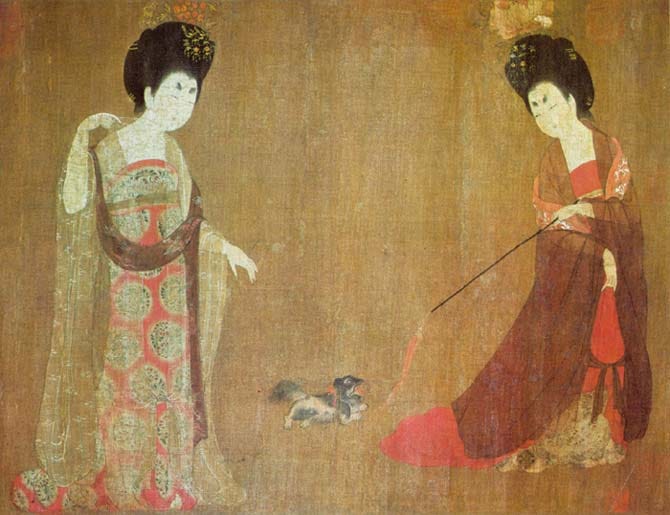
You enter the crowded hall in a swish of lotus-pink silk and take your seat to await the evening’s ceremony. You bow respectfully to your husband, General Han-Xiou, seated alongside you, cover your mouth with your hand and smile with your eyes.
How things have changed—the chirrup of crickets, even the way steam rises off the rice. Nothing is the same. Barely a week ago, the General returned from a decade-long campaign to the north on behalf of Emperor Cao Pi; his long years in the saddle on the freezing plains have left him bow-legged and wracked with coughs. You would have preferred he stay away. A decade holding the balance of power in this sprawling household has been a heaven of sorts. You knew it would not last, and still it chafed to have lost it. Even before the General passed through the gates, while the horses’ dust was still the faintest smudge on the horizon, rice paper doors shifted and sighed as lesser wives and concubines plotted to ingratiate themselves with your husband. Take the General’s favourite concubine at the rear of the hall, for example. Everyone knows that pot of tea has steeped for too long. Heavily pregnant when her lover departed, she had provided the precious son the General coveted. The child is spoiled and prone to tantrums, but so like his father that the General cannot fail to love him. There is the General’s dried-up fish of a sister, all sharp bones and flapping lips, not to mention his latest flock of concubines, flighty girls with garish plumage who’d offered the aging warrior comfort during his trials and now wish to be part of his household. No, nothing will be the same for you and your daughter, who is a rare beauty and an accomplished musician but a daughter, nonetheless.
A gong thrums, the General waves a hand, and a line of servants carry in chest after chest of tribute to lay before the dais. Grateful for your husband’s service, the Wei Emperor has bestowed more riches on your family than you have ever seen, including pearls, golden platters, and lacquered boxes that glisten in the candlelight. There are rugs and scrolls, exotic spices, and sacks of perfumed tea…wait. What is that flicker of green? You lean forward. A jade necklace, almost translucent, and so delicate the gods might have crafted it. Had it once been a gift for a lover? Part of a woman’s dowry? You stifle a giggle. What does it matter? The original owner is surely dead. A surge of want swells beneath your ribs. More than anything, you want that necklace.
The evening drags on and the hall becomes stuffy as one by one the General rewards his brothers, his trusted advisors, his most esteemed warriors. You are drooping in the heat and your heart is burning with longing by the time the General turns to address his household.
You hold your breath. The jade necklace remains in the chest.
“For my consort, the Lady Xi…”
Blushing, you rise to your feet.
The General lifts a comb from the pile and hands it to you. “…carved from a noble elephant’s tusk, this ornament is meant for a princess.”
You bow. “I am unworthy of such a generous gift,” you say graciously. “I did only my duty, my lord.” And for that you deserve the jade. Not this ancient hunk of yellowing monster tooth.
Your husband dismisses you with a nod.
Numb with fury, you take your seat once more. You clutch the comb, its tines gouging holes in your palm, while the General bestows gifts on Second Wife (a coral bracelet), Third Wife (a porcelain teapot), and his dried-up fish of a sister (a pair of pearl earrings). At last, he calls his concubine from the rear of the hall.
“For the gift of a beloved son.”
Your stomach clenches when your husband places the necklace in the whore’s palm. Her bow is meek, but there is no mistaking the flash of triumph in her eyes. You shake with unrequited rage. What can you do? The ceremony is over.
Days and weeks go by and the want beneath your ribs swells like an overripe plum. You think of nothing but the necklace. It doesn’t help that the concubine flouts her good fortune at every opportunity. Not enough that she has birthed the only son, she has to goad you by constantly by running her fingers over the jade at her throat.
Sensing your distress, your daughter tries to soothe you by playing the erhu, but even the lilting music fails to calm you. You must have that necklace. The General is an old man: he won’t live forever, not with that cough rattling in his lungs. The necklace would offer you and your daughter security.
As time wears on you are consumed by boredom and bitterness. Then, one day, when the concubine and her son are playing outdoors under the gaze of the General, their kite plummets into a thicket of gnarly pines.
You see your chance. “Come, sister, let’s retrieve the toy together.”
Emboldened by her new-found status, the silly girl ducks beneath the boughs ahead of you. It is the smallest thing to reach up and hook a branch under the necklace. You shove her forward. She lurches, struggling for purchase, her sandals slipping on the pine needles. Her black eyes bulge. The necklace tightens. A purple bruise spreads across her throat.
By the time you emerge on the other side of the thicket with the kite, the whore is dead, and the boy is screaming.
“I saw you enter the trees together,” the General says some days later.
“If only she’d stayed with me,” you say. “We were separated in the shadows.”
The General decrees that the mother of his son will be buried in the family tomb. Ridiculous, yet no one dares contradict him.
“What of her necklace?” you ask, careful to curb your eagerness.
“Bad luck. Better to bury it with her.”
Bad luck. Good fortune. As far as you’re concerned, it’s all a matter of perspective.
“That is probably best,” you say. “I only hope the Emperor will not be offended.”
The General pauses. Perhaps he’s reminded that the Emperor has other, younger generals. “Give it to your daughter, then. For her dowry,” he says.
Bowing, you hide your smile behind your hand.
A week later, when the concubine has faded from everyone’s thoughts and the General has found a new diversion, your daughter begs you to allow her to wear the necklace.
Where is the harm? “You may wear it in our room when the door is closed,” you say.
She beams with excitement. She has already put it on and is gazing at her reflection in the mirror when the General’s dried-up fish of a sister calls you away to deal with a wily merchant. When you return, your daughter lies dead across her pallet, her eyes wide. A purple bruise mars her throat. This time, it is your scream that echoes through the household.
The family tomb is opened for the second time in a fortnight. Stone-faced and stricken with grief you dress your daughter for burial. You lay her erhu alongside her.
The General has come to look. “What about the necklace?” he asks.
By now, all the want beneath your ribs has gone. “That jade is bad luck,” you say. “Better to bury it with her.” If nothing else your daughter will have riches to keep her in the afterlife.
The General’s eyes narrow. “But the Emperor might take offense. Better that you wear the jade, Xi.”
What can you do? He watches you lift it over your head, your fingers brushing past the ivory comb. Then, gesturing to his men to remove your daughter’s body, he leaves.
Alone in the room, you touch your fingers to the jade. So delicate. Almost translucent.
The necklace tightens around your throat …
Lee Murray is a writer, editor, and poet from Aotearoa New Zealand, a Shirley Jackson Award- and five-time Bram Stoker Award® winner. With more than forty titles to her credit, including novels, collections, anthologies, nonfiction, and several books for children, she holds a New Zealand Prime Minister’s Award for Literary Achievement in Fiction, and is an Honorary Literary Fellow of the New Zealand Society of Authors. Read more at leemurray.info







Gorgeous prose from Lee, as always.
Wonderful Story!